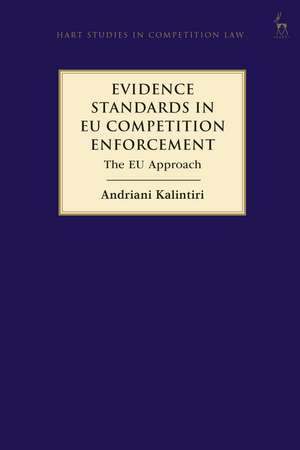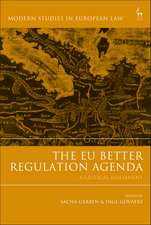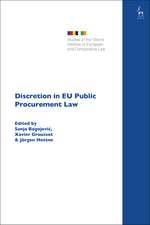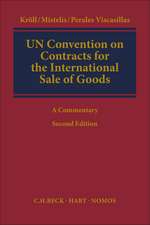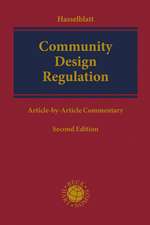Evidence Standards in EU Competition Enforcement: The EU Approach: Hart Studies in Competition Law
Autor Andriani Kalintirien Limba Engleză Paperback – 23 sep 2020
| Toate formatele și edițiile | Preț | Express |
|---|---|---|
| Paperback (1) | 251.65 lei 6-8 săpt. | |
| Bloomsbury Publishing – 23 sep 2020 | 251.65 lei 6-8 săpt. | |
| Hardback (1) | 511.14 lei 6-8 săpt. | |
| Bloomsbury Publishing – 6 feb 2019 | 511.14 lei 6-8 săpt. |
Din seria Hart Studies in Competition Law
- 30%
 Preț: 956.51 lei
Preț: 956.51 lei - 21%
 Preț: 275.26 lei
Preț: 275.26 lei - 18%
 Preț: 313.74 lei
Preț: 313.74 lei - 18%
 Preț: 313.07 lei
Preț: 313.07 lei -
 Preț: 315.54 lei
Preț: 315.54 lei - 22%
 Preț: 270.75 lei
Preț: 270.75 lei - 30%
 Preț: 540.54 lei
Preț: 540.54 lei - 27%
 Preț: 777.24 lei
Preț: 777.24 lei - 14%
 Preț: 893.15 lei
Preț: 893.15 lei - 30%
 Preț: 539.18 lei
Preț: 539.18 lei - 21%
 Preț: 217.35 lei
Preț: 217.35 lei -
 Preț: 365.91 lei
Preț: 365.91 lei - 22%
 Preț: 238.22 lei
Preț: 238.22 lei - 30%
 Preț: 779.09 lei
Preț: 779.09 lei - 18%
 Preț: 313.46 lei
Preț: 313.46 lei - 22%
 Preț: 261.17 lei
Preț: 261.17 lei - 23%
 Preț: 255.76 lei
Preț: 255.76 lei - 18%
 Preț: 299.96 lei
Preț: 299.96 lei - 21%
 Preț: 235.29 lei
Preț: 235.29 lei - 22%
 Preț: 250.09 lei
Preț: 250.09 lei - 18%
 Preț: 322.05 lei
Preț: 322.05 lei - 30%
 Preț: 894.38 lei
Preț: 894.38 lei - 22%
 Preț: 780.23 lei
Preț: 780.23 lei - 30%
 Preț: 539.57 lei
Preț: 539.57 lei - 24%
 Preț: 189.80 lei
Preț: 189.80 lei - 30%
 Preț: 837.39 lei
Preț: 837.39 lei -
 Preț: 319.13 lei
Preț: 319.13 lei - 30%
 Preț: 569.22 lei
Preț: 569.22 lei - 30%
 Preț: 961.39 lei
Preț: 961.39 lei - 27%
 Preț: 1136.75 lei
Preț: 1136.75 lei
Preț: 251.65 lei
Preț vechi: 323.09 lei
-22% Nou
48.15€ • 50.46$ • 39.81£
Carte tipărită la comandă
Livrare economică 11-25 aprilie
Specificații
ISBN-10: 1509945288
Pagini: 280
Dimensiuni: 156 x 234 mm
Greutate: 0.4 kg
Editura: Bloomsbury Publishing
Colecția Hart Publishing
Seria Hart Studies in Competition Law
Locul publicării:London, United Kingdom
Caracteristici
Notă biografică
Cuprins
Recenzii
All these intricacies and the various red lines throughout the book are drawn together in a series of reflections that show not only the amount of knowledge amassed in this book, but also the ability to take a step back and indeed observe competition law enforcement with feelings of bewilderment, awe, and interest. Anyone interested in the workings of competition law in practice as well as on the more abstract level should read this book and contemplate the knowledge and reflections found therein.
This is a very welcome addition to the prestigious Hart studies series on competition law. Both from a public and an academic perspective, the study addresses timely questions related to the most recent EU anti-trust fines and merger prohibitions. With the help of a systematic, far-ranging and detailed narrative of EU case law, Kalintiri develops a comprehensive typology for how evidence standards matter in EU competition proceedings.
Descriere
What rules or principles govern the assessment of evidence in EU competition enforcement? This book offers, for the first time, a comprehensive academic study on the topic. Its aim is twofold. Firstly, it produces a typology of evidence standards in competition proceedings at the EU level, thereby systemising the guidance that is currently dispersed in the case-law of the EU Courts. Secondly, it examines the applicable evidence rules and principles with a view to better understanding their role in EU competition enforcement. In so doing, the book illustrates that evidence standards are not mere technicalities and their significance should not be underestimated. Rigorous and engaging, this work provides a much-needed analysis of a key question of EU competition enforcement.
